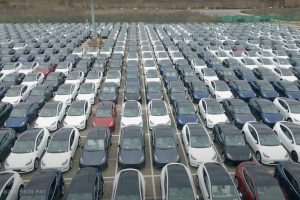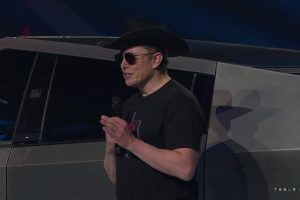Key Takeaways
- A suspect has been charged for firebombing two locations in New Mexico, including a Tesla store.
- U.S. Attorney General Pam Bondi and FBI Director Kash Patel are involved in the case and are seeking up to 40 years in prison for the suspect.
- The suspect, Jamison Wagner, 40, was charged with malicious property destruction by fire or explosives at both a Tesla store and a Republican Party office.
- Vandalism around the Tesla Albuquerque store included graffiti with Nazi references and threats against Elon Musk.
- Authorities found incendiary devices and matching spray paint in Wagner’s home, linking him to the crimes.
- These acts are viewed as “domestic terrorism” due to Musk’s controversial political associations.
- A string of similar attacks targeting Tesla locations and vehicles globally, including a notable case in Italy and a Supercharger explosion in Washington.
In recent months, Tesla has faced a spate of troubling vandalism and arson attacks that have targeted its stores and vehicles across the globe. These incidents, culminating in the arrest of a suspect linked to New Mexico attacks, highlight a growing wave of domestic terrorism partly tied to political tensions. This blog post delves into the incidents, the individuals involved, and the broader implications for Tesla and its CEO, Elon Musk.
The Arrest and Charges
Authorities in New Mexico recently arrested Jamison Wagner, a 40-year-old resident of Albuquerque, in connection with firebombing attacks on a Tesla store and a local Republican Party office. Charged with malicious property destruction by fire or explosives, Wagner faces severe legal repercussions, with U.S. Attorney General Pam Bondi and FBI Director Kash Patel pushing for a prison term of up to 40 years.
The Nature of the Attacks
The vandalism at the Tesla store included alarming graffiti with Nazi references and direct threats against Elon Musk. Such actions have been strongly condemned by officials and have drawn attention to the heightened risks associated with Musk’s contentious political affiliations.
Exploring the Link: Elon Musk’s Political Involvement
Elon Musk, the charismatic and often controversial figure behind Tesla, has had a history of polarizing political involvement. His engagement with political figures, notably from the Trump administration, has stirred both support and opposition. The vandalism acts against Tesla locations have been partly fueled by these political tensions, with perpetrators viewing their actions as a form of protest against Musk’s associations.
Global Context: A String of Attacks
The incidents in New Mexico are not isolated cases. Tesla stores and facilities have been targeted globally, reflecting a pattern of coordinated or copycat attacks:
- Las Vegas, USA: A Tesla repair center was attacked using Molotov cocktails, setting fire to the building and several vehicles.
- Rome, Italy: An attack led to 17 cars being set on fire, with investigations ongoing by Italy’s anti-terror police, DIGOS.
- Washington, USA: An explosion at a Tesla Supercharger station, with ongoing efforts by Tesla and the FBI to identify suspects from security footage.
Authorities’ Response to “Domestic Terrorism”
These attacks are being categorized as acts of “domestic terrorism.” Both federal and local authorities are treating these cases with utmost seriousness, underscoring the implications of such acts on public safety and corporate security. The FBI is actively collaborating with Tesla to identify and prosecute those responsible, while also examining potential preventive measures to safeguard against future incidents.
Security Measures and Future Outlook
In response to these alarming threats, both Tesla and law enforcement agencies are intensifying security measures. These efforts include:
- Enhanced Surveillance: The installation of more sophisticated security cameras and systems at key Tesla locations.
- Public Awareness Campaigns: Educating the public about the consequences of such actions and encouraging cooperation with law enforcement.
- Increased Legal Penalties: Lobbying for harsher legal penalties to deter future offenders.
Navigating a Challenging Landscape
Tesla’s recent experience with vandalism and arson attacks underscores a broader societal challenge of addressing politically motivated violence. As the company fortifies its defenses and collaborates with law enforcement, it also faces the task of addressing the public discourse surrounding its leadership and political engagements.
While these incidents represent significant challenges, they also offer lessons in resilience and the importance of addressing issues of security, corporate responsibility, and political sensitivity in an increasingly polarized world.





